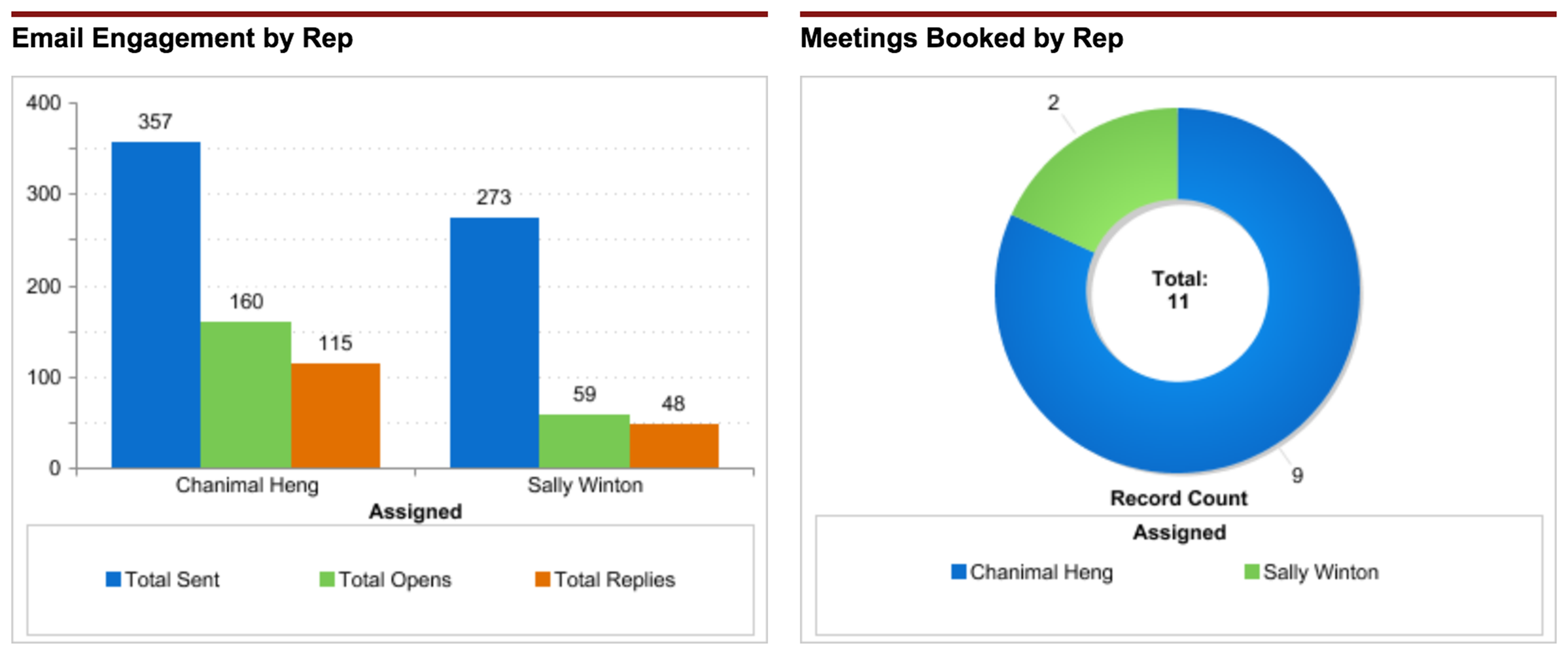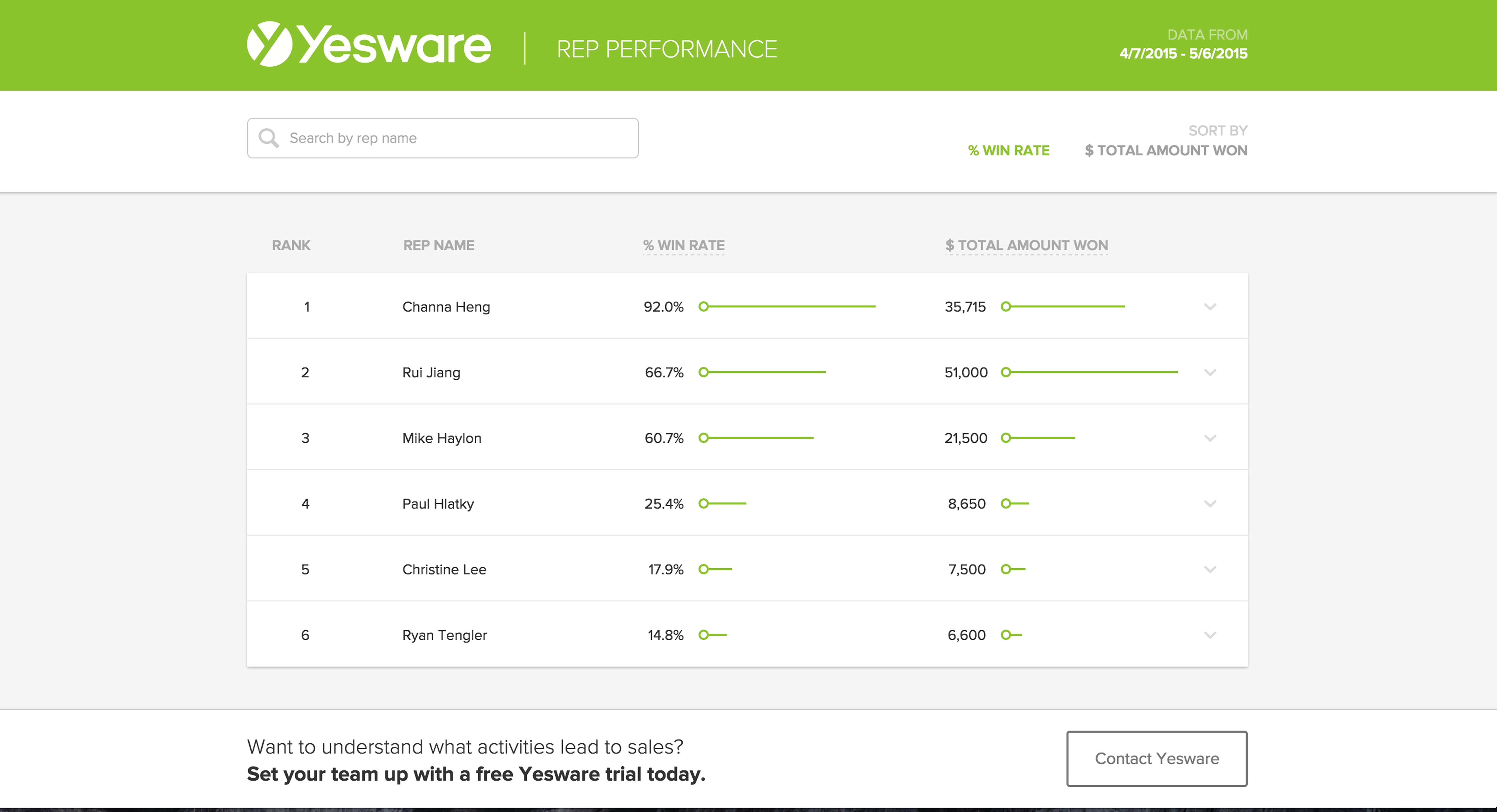
Get your FREE 30-day trial.
Please complete all fields.
No two people are alike. This adage is often forgotten by sales leaders. More time and resources are dedicated to sales team training than 1:1 coaching, and I believe this is a big mistake.
Team training is not as effective as we think. According to a sales performance optimization study by Accenture, 35 percent of Chief Sales Officers are unsure what measurable improvements result from team training. Individual coaching may require more time than team training, but a study by the Aberdeen Group indicates that coaching is worth the extra effort. The study found that 84 percent of the highest performing sales teams provide coaching to under-performing reps.
Luckily, new tools are emerging that make it easier for sales leaders to monitor rep performance. For example, Yesware, the company I work for, offers a free Sales Activity Dashboard app in the Salesforce AppExchange. The dashboard gives sales leaders a clean and simple view of each rep’s activity, so performance issues can easily be identified.
Of course, analytics are useless unless you do something with the insight gained. Here are five performance metrics sales leaders should track regularly for each rep, and some tips on how to act on the data.
Sally, a sales rep on my team, was struggling to get meetings booked. She came to me, confused, wondering what she was doing wrong. I looked at her performance metrics and easily identified the root of the issue. Her number of outbound activities — phone calls and emails to prospects — consistently exceeded her teammates. This indicated it wasn’t the quantity of outbound requests causing Sally’s problem, but rather the quality of her phone and email pitches. We worked together to refine her email templates and phone pitches, and as a result, things quickly turned around for Sally, to both of our delight!

Are your reps booking meetings, but not closing enough deals? These two metrics can help indicate which rep’s demo skills or negotiation tactics need some work. While demo and negotiation skills are commonly addressed with team training, I believe 1:1 coaching is far more effective. A rep may be struggling to close deals during meetings due to a plethora of reasons, from lack of product knowledge to poor eye contact. Without individual coaching, these issues can easily fall under the radar.
When analyzing metrics, it’s important to compare performance at opposite ends of the sales process. For example, a rep with plenty of accounts but a low average deal size may need help on a variety of levels. Is he doing a poor job qualifying leads? Is he spending too much time qualifying and not enough time negotiating bigger deals? Again, these issues can more easily be addressed in-person, as the underlying problem will vary greatly from rep to rep.
This isn’t a metric you’ll find on any spreadsheet or dashboard. In fact, it’s not driven by data at all. Internal win-rate is how I qualify a rep’s ability to build relationships with other employees. For example, I hired a new sales rep about six months ago, and according to 'sales metrics,' he was doing all the right things. But his approach internally was less than collaborative. He was abrasive with members of other departments and people started to shy away from working with him. The ability to sell "internally" is just as important as the ability to sell to customers, and ultimately, we had to let him go.
A rep that consistently beats team averages is a huge opportunity that sales leaders often overlook. Sales leaders should work just as closely with high-performing reps as they do underperforming ones. Working together, a star rep and sales leader can identify what’s driving the rep’s high-performance and set up a system to help other reps replicate the behavior.

The concept of “performance monitoring" can have a bad rap, but if it's done in the spirit of professional development, both the sales rep and leader will embrace the concept. I’ve found that sales reps enjoy getting feedback regularly and are eager to advance their careers. As a sales leader, I believe it’s your responsibility to help reps achieve their full potential. If you see a rep struggling, make it a top priority to help diagnose the problem and get the rep back on track.
Bridget Gleason is VP of Sales at Yesware, an all-in-one sales acceleration platform, where she manages the company’s sales efforts. With twenty years of sales and sales management experience in the high technology sector, Bridget is an expert on the inner workings on the sales cycle. You can learn more about Yesware on the Yesware AppExchange page.